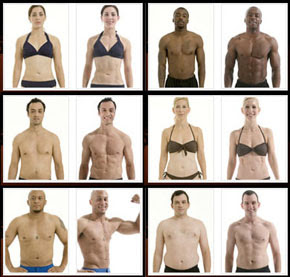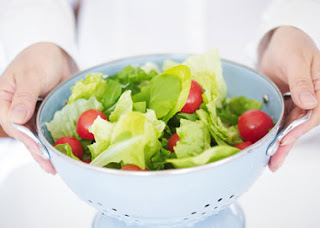How Healthy Are You? Fill In the Questionnaire
Author: Linda LazaridesWe think of "healthy" people as ones who are always exercising and eat nothing but yoghurt and carrots. In fact being healthy is more about a feeling of wellbeing and blissful unawareness of your body. To find out your real state of health and your prospects for the future, select the score (in brackets) that applies to you for each question, add up your score for each section and read the advice given.
SECTION 1: BODY CONDITION
1. For your height and build, would you say you areUnderweight (1)
Medium weight (0)
Overweight (2)
Very overweight (6)
If you are not sure, try pinching the skin around your waist or ribs. If you can easily 'pinch more than an inch' you are probably a little overweight. The more you can pinch, the more overweight you are.
2. Select a score for your energy levels
I am usually fairly energetic (0)
I am generally energetic but tire easily (4)
I get around ok but find it hard to cope with energetic activities (6)
I feel tired most of the time (10)
3. Select a score for your bowel movements
I have a bowel movement less than once a week (3)
I have a bowel movement every few days (2)
I have a bowel movement every other day (1)
I have a bowel movement every day (0)
4. If any of the following apply to you, please add up the scores
Dandruff (1)
Dizzy and shaky when hungry (1)
Easy bruising (1)
Fluid retention (1)
Frequent infections (1)
Hot flushes (1)
Mood swings (1)
Nervous problems (1)
Period pains (1)
PMS (1)
Regular thrush (yeast infection) or other infections (1)
Skin rashes or eczema (1)
Split or brittle nails (1)
Spotty skin (1)
White spots on nails (1)
Now add up your total Body Condition score (all questions, 1-4)
0-5 = Good
6-10 = Average
11+ = Poor
Advice
The higher your body condition score, the sooner you need to pay attention to your health. Health can always be improved by paying attention to your diet, stress and surroundings. First try to reduce your score in the sections below, and also follow the advice given in my free 'Healthy Plate' diagram available from my website (see at the foot of this article).
SECTION 2: POLLUTION
If any of the following apply to you please add up the scoresI am a passive smoker (1)
I live in an area of heavy traffic (1)
I use quite a lot of strong-smelling chemicals in my home such as perfumed air fresheners and cleaning/polishing sprays, cosmetic sprays and so on (2)
I have a lot of silver fillings in my teeth (2)
Where I work I am exposed to fumes, chemicals, radiation or high dust levels (2)
I am a moderate to heavy smoker (7)
Now add up your Pollution score
1-2 = Some potential risk to health
3-6 = Moderate risk to health
7+ = Potentially high risk to health
Advice
Pollution causes a risk to health by introducing foreign substances into your body. If allowed to build up these can interfere with some of your body's functions. If you are a smoker, make a list of the advantages (as you see them) and disadvantages of smoking, perhaps with the help of your non-smoking friends. Hopefully in time you will be convinced enough by the disadvantages to set a date for giving up. Meanwhile, practise gradually reducing how much you inhale from each cigarette (that technique worked very well for me - I successfully gave up 20 years ago).
Avoid exercising by busy roadsides. Use unperfumed household chemicals and cosmetics where possible. If your own dentist won't give you white fillings, change to a dentist who will - silver fillings release small amounts of the toxin mercury. If your job exposes you to chemicals or pollutants, observe all proper precautions and try to keep windows open if you can.
SECTION 3: EXERCISE
Please select the answer that applies to youI spend most of my time sitting or lying down and get very little exercise (5)
Most days I spend at least one hour walking or doing other light activity, or 20 minutes doing work or activity that gets me out of breath (1)
Most days I spend at least two hours walking or doing other light activity, or one hour doing work or activity that gets me out of breath (0)
Your Exercise score
5 = Poor
1 = Good
0 = Very good
Advice
Exercise is important to keep you healthy. Even if you are disabled you may be able to swim or lift weights. And while not everyone has the inclination to exercise, everyone has the time! Walking, cycling and sports are less monotonous than exercise bikes and swimming lengths in a pool. Why not get out into the countryside at weekends and follow a long, brisk walk from a book of 'circular walks'? A few hills will raise your heart rate, which is excellent to keep your heart and circulation in good condition.
SECTION 4: STRESS
If any of the following apply to you, please add up the scoresI have a relationship, job or other long-term situation that makes me unhappy most of the time (1)
I tend to drive myself quite hard most of the time and rarely relax (1)
My job is of a kind involving fairly high stress levels (2)
I feel easily stressed and find it hard to cope even with small difficulties (5)
Your Stress score
1-2 = Moderate
3-4 = High
5+ = Very high
Advice
Illness is not just physical. Bad nerves, anxiety and irritability are a form of illness which should be taken more seriously although sufferers often feel that they should just get on with life. If you have any of these problems, your immune and hormonal systems could suffer if you don't find ways to reduce your exposure to stress. Take a little time to sit down quietly and write down what you would ideally like to do to have the kind of life you want. Set a date for when you think you will be ready to do it. Seek help from a counsellor if you feel that you can't cope on your own.
SECTION 5: DIET
If any of the following apply to you, please add up the scoresI eat fresh vegetables, fruit or salad vegetables less than once a day (3)
I eat as much as or more crisps, chocolate, sweets, ice cream, biscuits or other sweet snacks than I do food in meals (2)
I tend to grab food 'on the run' like hamburgers and pies, rather than eating proper meals (2)
Most of the liquids I drink are either sweetened with sugar, or are alcoholic drinks (1)
I usually eat ready-sweetened breakfast cereals (1)
I usually eat white bread rather than wholemeal (1)
I often eat processed or fatty meat such as sausages and burgers instead of fish or lean meat or chicken (1)
I eat deep-fried food most days, like chips and foods coated in batter (1)
I usually prefer my food to be quite heavily salted (1)
Now add up your Diet score
1-4 = Not ideal
5-9 = Poor
10+ = Potential risk to health
Advice
We hear so much contradictory advice about healthy eating that most of us are quite confused. Should we eat butter or margarine? Does sugar give you energy or is it bad for you? Is meat ok? Do potatoes make you put on weight?
The basic principles of healthy eating are actually quite simple. As a general rule, the foods you should eat most of are those closest to their natural state. Fresh vegetables and wholegrains should form the majority of your diet. Vegetables don't have to be eaten plain, they are delicious made into soup or added to casseroles. Wholegrains can be cooked like rice or porridge, or eaten as bread or biscuits. Your main protein foods, which can include milk, cheese and yoghurt as well as chicken, fish and soy products, should be low in fat. But olive oil, and the oils in nuts and seeds are actually beneficial, and should also form a small part of your diet. Ideally, everything else - sweets, cakes, cream, butter, red meat and most margarines, pastry, chocolate, alcohol and so on - should in total be kept to 10 per cent or less of your total food intake.
HOW DID YOU DO?
Did you get mostly low scores?You are looking after your body's needs relatively well. Pay particular attention to those areas where you did get a medium or high score, and see what you can do to improve your rating.
Did you get mostly middling scores?
There are some potential risks to your health, but it is never too late to make the right adjustments. Do remember that you don't have to be perfect straight away. Lifestyle changes are not easy, and rushing into them may result in giving up too easily. Take one thing at a time, and make the changes as you feel ready.
Did you get mostly high scores?
The potential risks to your health are greater, and quite a few things need your attention. Maybe when you were young you were never taught much about lifestyle at home or at school, or maybe you have given it a low priority. Perhaps you could do with some cookery lessons, or a book on healthy eating to give you some ideas. And if you think you 'don't like' vital foods like vegetables, there are always ways to make them appetising. Don't despair - habits take time to break, especially as highly processed foods can be quite addictive due to their high sugar or salt content.













